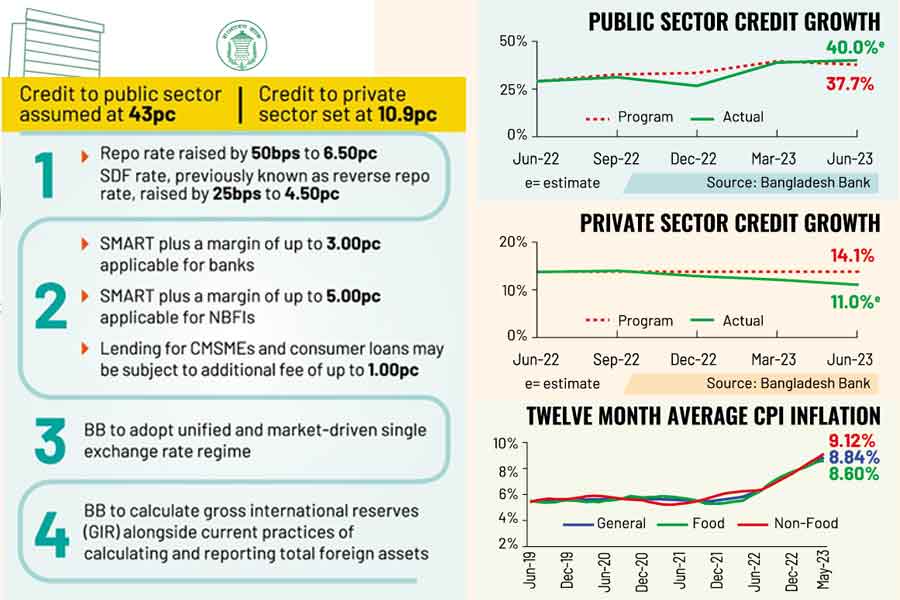MPS targets tight money supply to combat inflation
Easing exchange-rate pressures, stemming forex depletion second cardinal MPS goal BB unveils for H1 of FY24

Published :
Updated :

Policy rates are rising to check cheap fund availability and aggregate consumer demand will be reduced alongside maintaining supply-side interventions as tools to defuse inflation under a new monetary policy Bangladesh now pursues.
Bangladesh Bank (BB), the country's central bank, Sunday rolled out the "contractionary" monetary-policy stance for July-December 2023 period in order to contain the inflation which stood at a nearly double-digit high in May.
Bangladesh Bank Governor Abdur Rouf Talukder explained the reasons for the tight money supply in the economy while unveiling the half-yearly or H1 monetary policy statement or MPS at a press meet held at its headquarters, highlighting some key challenges facing the economy - the fastest depleting foreign-exchange reserves and exchange-rate volatility.
The Governor said the rising inflation and sustained exchange-rate pressures continue to pose significant challenges for Bangladesh's economy.
"Containing inflation will be the first and foremost objective of this monetary-policy statement or MPS.
"The strategy will be to reduce the aggregate demand in the economy while continuing the supply-side interventions."
Terming the nature of the MPS different than others, he said the central bank has brought four major structural changes in the policy, meant for confronting the challenges the economy is facing.
Firstly, the BB will transition from monetary targeting to an interest-rate-targeting framework. That is, the target policy-interest rate, set at 6.50 per cent, will be accompanied by plus-minus 200-basis-point symmetric corridor consisting of a standing lending facility (SLF) or previously called special repo at 8.50 per cent and the standing deposit facility (SDF) or formerly called reverse repo rate at 4.5 per cent.
"Unser this new framework, the interbank call-money rate will closely align with the policy rate, ensuring stability," the MPS reads.
It also reads conforming the tight monetary-policy stance, the BB decides to increase the policy rate.
The policy rate or repo rate is adjusted upward by 50 basis points from 6.0 per cent to 6.5 per cent. The SDF is adjusted upwards by 25 basis points from 4.25 per cent to 4.50 per cent effective from July 01, 2023.
This measure is believed to be to make the cost of borrowing expensive which may lead to limiting impact on the consumer-price index (CPI) inflation.
Secondly, the BB intends to introduce a market-driven reference lending rate for all types of bank loans, replacing the previously imposed lending-rate cap.
This move aims to enhance competitiveness in the banking sector and foster a favorable lending environment for businesses and individuals.
The reference lending rate, known as the 'SMART' (six-month moving average rate of Treasury bill), will be announced monthly through the BB website, with a margin applied for banks and non-bank financial institutions (NBFIs).
In practice, SMART plus a margin of up to 3.00 per cent will be applicable to banks, and SMART plus a margin of up to 5.00 per cent will be applicable to NBFIs.
However, the lending activities for CMSMEs and consumer loans may be subject to an additional fee of up to 1.00 per cent to cover supervision costs and there will be no changes in the interest rates applicable to credit card loans.
The BB governor said the single-digit lending rate was the political decision and was justified at a time when banks used to charge a 17-18-percent rate.
"This time this is also a political decision as the present policymakers are aligned with the views," the governor said.
In commenting on the new MPS economists were divided over the moves taken by the central bank.
Dr Ahsan H. Mansur, executive director of the Policy Exchange of Bangladesh (PRI), told the FE that the objectives are quite okay. "But we are looking forward about its operational aspects…"
Dr Zahid Hussain, former lead economist of the World Bank, told the FE that there are some steps to control the inflation.
He said the smart rate will be regulator-administered so it will not bring effective changes on the financial market. He means about the components of the SMART that is based on the treasury bills.
"…such administered rates do not change significantly."
Dr Masrur Reaz, chairman of the Policy Exchange of Bangladesh, told the FE that the MPS moves are in the right direction as the BB will now adopt a unified and market-driven single exchange-rate regime.
He welcomes the BB step for calculating the GIR in line with the IMF. But he thinks that there is need for capacity building for the regulator to monitor the changes.
The monetary and credit projections under the MPs are: broad money target has been reduced to 9.5 per cent up to December 2023, down by 1.0-percentage points of June 2023 estimation.
The domestic credit target has been set at 16.9 per cent, up 0.5-percentage points than that of June estimation.
The credit to the public sector has been assumed at 43 per cent, up by 3.0 percentage point than June 2023 estimation.
The credit to the private sector has been set at 10.9 per cent, down by 0.1 percentage point than June 2023 estimation.
jasimharoon@yahoo.com


 For all latest news, follow The Financial Express Google News channel.
For all latest news, follow The Financial Express Google News channel.